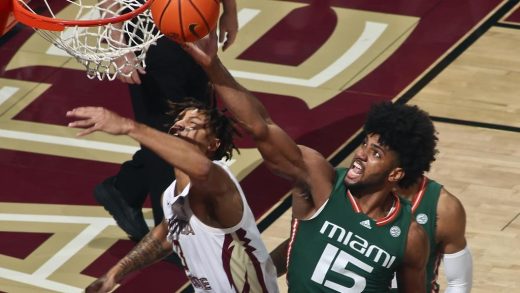
Curiosity has always been a driving force for Davis Payne.
The character trait is especially helpful in the coaching industry, where keeping up with new trends while staying on top of why the current ones are working, is critical.
“I’ve always been a tinkerer,” Payne said during a one-on-one interview at the 2024 NHL Draft in Las Vegas. “The inner workings and the fine details of what leads to success. Why it happens versus why it doesn’t happen has always been something that fascinates me, not just in hockey but in a number of different areas. It’s something with our sport that I genuinely enjoy.”

Davis Payne’s career record at the NHL level is a respectable 67-55-15. (Jeff Roberson / The Associated Press files)
Payne has been heavily involved in the getting-to-know-you phase since he was hired along with Dean Chynoweth to round out Scott Arniel’s staff in June.
Calls have been made to players and ample time has been spent with Arniel and the rest of the staff during the past few weeks — including some valuable time at the Jets’ coaching summit last week.
Payne’s path to this point is an interesting one.
Born in Port Alberni, B.C., the 53 year old found his passion for the game at a young age and his playing career included four seasons of NCAA hockey at Michigan Tech as a hard-working winger with the Huskies.
Originally chosen in the seventh round of the 1989 NHL Draft by the Edmonton Oilers, Payne battled his way to suiting up in 22 NHL games with the Boston Bruins by doing things the hard way.
There were a lot of tough miles on the journey, including multiple seasons in the ECHL — where Payne’s best year included 25 goals and 61 points in 62 games to go along with 175 penalty minutes.
He also had 35 goals and 72 points in 108 American Hockey League games over the next two seasons with the Providence Bruins, which overlapped with those 22 games with the Bruins in 1995-96 and 1996-97.
After wrapping up his playing career, Payne transitioned to an assistant coaching job with the Greenville Grrrowl of the ECHL — the team he spent his final two seasons with.
Before the season was over, he had been hired by the Pee Dee Pride as the head coach and helped lead the team to the third round of the Kelly Cup playoffs.
Payne spent seven seasons in the ECHL in a head coaching role, leading the Alaska Aces to the league title in 2006.
After being promoted to assistant coach of the Peoria Rivermen for one season, Payne took over as head coach of the St. Louis Blues’ primary affiliate.
Before his second season in that role was complete, Payne got his first NHL head coaching gig, replacing former Winnipeg Jets head coach and Manitoba Hockey Hall of Famer Andy Murray.
Just 39 years old, Payne took over a team that would miss the Stanley Cup playoffs in consecutive seasons and he was fired by Doug Armstrong just 13 games into the 2011-12 campaign.
His career record at the NHL level is a respectable 67-55-15, good for a .545 winning percentage, but that was Payne’s first real welcome-to-the-coaching-fraternity moment.
“It was tough because I had been in coaching for probably 10 years and you didn’t know the reality of the business side being as harsh as it is,” said Payne. “You’ve got to deal with the fact that people are saying that you failed.”
How did Payne deal with the debriefing process of where things went wrong with the Blues?
“It was about finding different areas, different ways, different situations to pick yourself back up. Just like anybody does,” said Payne, noting that Armstrong remains one of his mentors, despite the fact he fired him. “We’re not all dealt roses and rainbows. It’s no different than a player’s mentality. If you have a bad shift, you’re getting another one, go out and do it better. You had to sort of develop that mindset.
“You’re either going to be one and done, or you’re going to keep going. I’m probably not bright enough to quit, so I kept going.”
Rather than lament the opportunity that didn’t go as planned, Payne dug in and has spent the past 12 seasons as an NHL assistant coach, with the Los Angeles Kings, Buffalo Sabres and Ottawa Senators.
His journey included winning the Stanley Cup with the Kings in 2014, with the clincher coming against Arniel’s New York Rangers in five games.
“It’s pretty humbling,” said Payne, asked what it was like to see his name engraved on the Stanley Cup for the first time. “Knowing that a lot more people put in the work than just the one name. The enjoyment they get out of that is as important as my own. But truly, when you get a chance to share it with friends and family and coaching staff and players, it’s such a shared feeling and I can’t wait to do it again.”
Whether it’s reaching the pinnacle of the sport or the trials and tribulations along the way, Payne has enjoyed every step of the process.
“Without a doubt. It’s a matter of going to the NHL, understanding the player, understanding the routine and understanding what it takes. Then, having a chance to taste some success and understanding exactly what it takes, what has to go into it,” said Payne. “Those experiences you gain along the way from every up and down. There’s as much to learn from winning a championship as there is from missing the playoffs. There’s ground to cover and things to figure out. Every step along the way has always been about learning how to do something a little bit better.”
With the Jets, Payne will be running the forwards and the power play and he’s excited about some of the pieces at his disposal, while recognizing that improving the power play efficiency is a priority for the upcoming season.
“Whatever unit you want to talk about, whatever player you want to talk about, there’s some really skilled players that you can work with to help the hockey club. So that’s enticing,” said Payne. “I truly believe that you have to be dangerous from above and you have to be dangerous from below and constantly attacking.
“It will be from above, it will be from below, it will be from both sides of the ice. I don’t feel like the guy at the net always needs to be the guy at the net. Guys moving in and out on the backsides. It just gives you constant threats and different threats, so that there’s going to be a little bit more of a dynamic to it the guys will enjoy.”
ken.wiebe@freepress.mb.ca
X: @WiebesWorld

Ken Wiebe
Sports reporter
Ken Wiebe is a sports reporter for the Free Press, with an emphasis on the Winnipeg Jets. He has covered hockey and provided analysis in this market since 2000 for the Winnipeg Sun, The Athletic, Sportsnet.ca and TSN. Ken was a summer intern at the Free Press in 1999 and returned to the Free Press in a full-time capacity in September of 2023. Read more about Ken.
Every piece of reporting Ken produces is reviewed by an editing team before it is posted online or published in print — part of the Free Press‘s tradition, since 1872, of producing reliable independent journalism. Read more about Free Press’s history and mandate, and learn how our newsroom operates.
Our newsroom depends on a growing audience of readers to power our journalism. If you are not a paid reader, please consider becoming a subscriber.
Our newsroom depends on its audience of readers to power our journalism. Thank you for your support.



